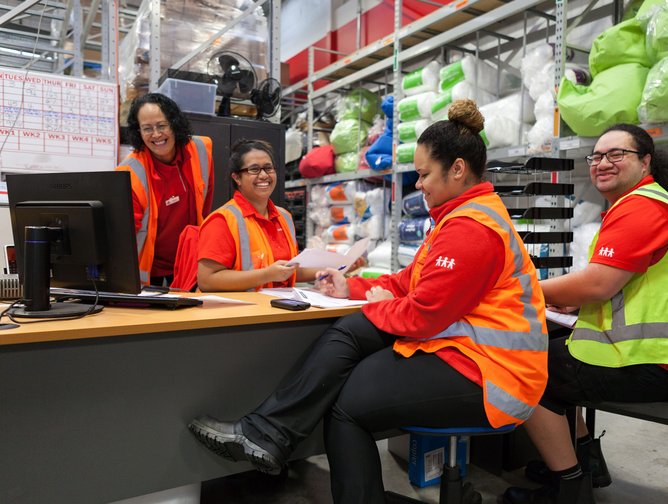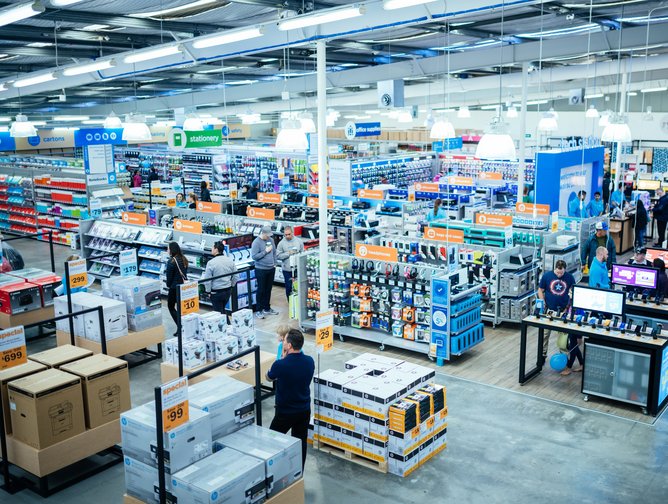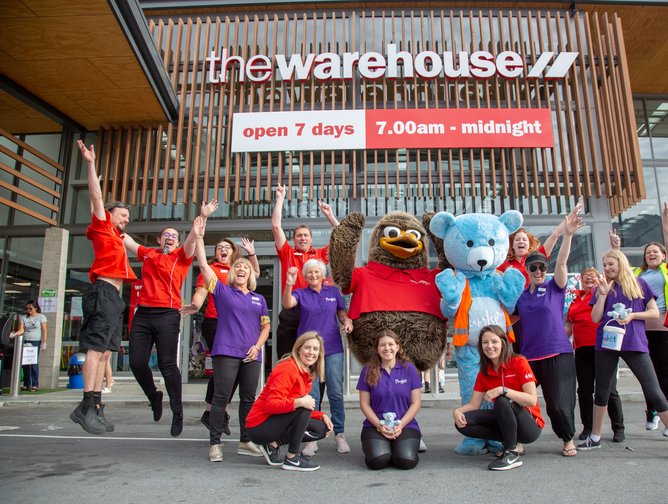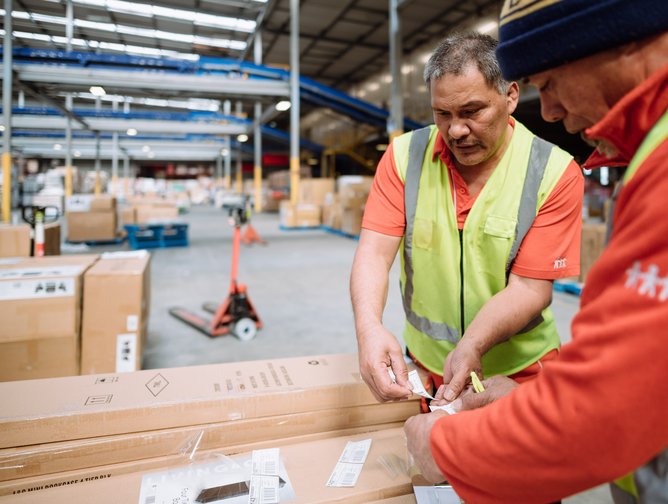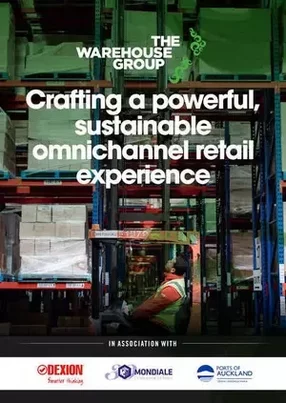The Warehouse Group: driving omnichannel retail through supply chain innovation
Founded by Sir Stephen Tindall in 1982, The Warehouse Group (TWG) has become New Zealand’s largest non-food retailer. Across its laudable brand portfolio – comprised of The Warehouse, Noel Leeming, Warehouse Stationery, Torpedo7 and 1-Day – the Group operates over 250 stores throughout New Zealand while working towards creating a true omnichannel retail experience. Chris Foord, Chief Logistics Officer at the company, is overseeing the ongoing evolution of its logistics and fulfilment functions; a role whose industry-wide importance continues to become a recognised core element of any successful modern business.
“Like many organisations, TWG has realised the competitive advantage of supply chain, from sourcing and distribution through to the store and the customer,” says Foord. “Rather than simply being a back-of-house transactional function, we are now seen as an efficient and effective supply chain that enables a competitive advantage in the wider organisation’s strategy.” Foord notes that this centralisation of the supply chain function within the overarching business strategy will become more entrenched as omnichannel retail continues to become an expectation in the industry. “Where there used to be a buffer between logistics or distribution and the customer via the in-store experience, there’s now a very direct physical handover in terms of the delivery connection and interaction as we fulfil orders.”
The changing needs and expectations of the customer, centred around speed, convenience, choice and the infamous last mile, have inspired a vast range of implemented solutions that drive increased efficiency, sustainability and customer satisfaction. TWG has recently expanded its data science team to better leverage the latent insights of its data sets, and already has a history of implementing automation technologies that will continue through the worldwide shift to Industry 4.0. “Many years ago, when we built one of our larger distribution centres, we included automation within it that was then viewed as state-of-the-art,” Foord explains. “That stood us in great stead for a long time, and we’re now looking at ways to make that automation smarter to meet both our and the customer’s growing needs.” TWG is currently in the process of introducing its new warehouse management system, developed by Manhattan Associates, that is set to overhaul the efficiency of its warehouse operations. “It’s going to significantly improve our distribution and logistics centre capability, enabling efficiencies that will save north of NZ$5mn each year,” enthuses Foord.
“The new system will have three key benefits for our operations: allowing us to have greater visibility of all of our different departments and tasks in the operation; enabling dynamic organisation of tasks and orders; and facilitating decision-making based on real-time information and data, using interweaving capabilities to assign tasks based on the most productive and efficient route.” Foord summarises the effect of these elements in the replacement of restrictive manual tasks with automated technologies. Robotic process automation (RPA) has been used to automate a range of manual tasks on the finance side, and machine learning has been deployed to regularly clean the firm’s master data to maximise its value for generating insights. “It’s freed up our team to do more value-added activity, and ensures that we are more targeted and effective with our operations,” says Foord.
This mentality of harnessing technology to benefit teams and drive efficiency is central to TWG’s people-led business ethos. “When you’re going through a transformation, you have to drive a cultural shift as well,” says Foord. “Our focus throughout has been to get the culture right and thereby enable the transformational outcome. We have been developing a performance culture where we ensure that people have clarity of objectives, are offered regular feedback and coaching, and are exposed to development opportunities to stretch their skills and grow.” TWG’s commitment to its people is matched by its commitment to the environment, with a sustainability strategy aimed at reducing the company’s impact on the environment and encouraging sustainable behaviour in team members, customers and suppliers. “Sustainability has become a huge focus for the industry, and we are extremely proud to have recently announced that we are carbon neutral,” says Foord. In February 2019, TWG achieved the internationally-recognised carboNZero certification, becoming the first large company in New Zealand and the third major retailer in the world to do so. “While we’re now carbon neutral, which is amazing, we’re not resting on our laurels. We’re continuing to implement more sustainable methods of shipping and domestic transportation. For example, maximising our container loads and, where feasible, partnering with shipping lines who have the more efficient vessels in this space.” Serving as an umbrella for each of these endeavours and successes, TWG has established a strategic sustainability plan to drive it towards the goal of being New Zealand’s most sustainable retailer. The plan is based on three key pillars: product, planet and people. “From a supply chain and logistics point of view, we’re primarily focused on the products stream,” explains Foord. “For example, efficiencies in transportation and delivery as well as packaging. It’s about finding that balance between protecting the product from damage and meeting customer expectations whilst reducing unnecessary waste and/or plastic.” Foord adds that, through its online fulfilment operations, TWG is currently transitioning away from plastic fillers and protection to 100% recyclable, paper-based products. TWG is also paying consistent attention to the development of electric vehicles (EVs), building on the fact that the majority of vehicles in its customer delivery fleet are hybrid. The firm’s light vehicle fleet is incrementally shifting over to full-electric alternatives, with 30% of its vehicles in this class set to be replaced with EVs this year.
Of the key successes of the transformation, Foord doesn’t hesitate to earmark the firm’s culture as a particular highlight. “It’s all about our people,” he says. “The transformation has enabled and celebrated the owner’s mindset: people treating the business as if it’s their own, looking after every dollar, every cent, to ensure that we are creating value for both the organisation and our customers.” He adds that the process has also provided employees with the tools to develop and execute ideas at pace. “One thing our business has never lacked is good ideas,” says Foord, offering an example of the internal innovations that this culture has enabled. “One of our team members saw an opportunity to improve our fulfilment centre packing station. As packing materials were stored in a number of different areas, processing an order was time-consuming and inefficient. She designed a new packing station that keeps all the materials together, and her partner constructed a demo to test it out. Through that, we’ve ended up with an incredibly ergonomically-designed packing station that has yielded an 8% increase in the number of orders we can process.” This type of innovation, spurred by a culture that encourages its employees to not only think outside the box but also take ownership of TWG’s successes and challenges. “The owner’s mindset epitomises the transformation journey that we’re on,” says Foord.
Championing the successes of its digital and supply chain transformation in a holistic, Group-wide sense, TWG’s 2018 annual report featured elements of integrated reporting to highlight the progress of its strategy as well as its commitment to its people, community and environment. Highlighting aspects beyond the financial details typical of an annual report, TWG zeros in on the finer points of its transformation, highlighting innovation, sustainability, diversity, talent development and its work within New Zealand communities. In sum, its new reporting strategy focuses on the factors that exemplify its people-led focus and ethos. Looking forward, Foord sees nothing but a continuation of the bold and exciting strategy that is leading the Group to success and the realisation of a next generation retail experience for its customers. “The key next step for the Logistics function is to embed the new warehouse management system and then to optimise that across our network,” he says. “As with many global retailers, we’re moving towards a seamless omnichannel experience, but we’re not quite there yet,” he says. “Our goal is to be able to serve our customers in whatever way they want, irrespective of how they choose to engage with us. It’s about us being able to offer a suite of channels that can sustainably deliver on that promise.”
